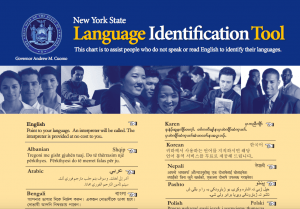Access to healthcare can be determined by several factors (i.e. geographical location, income, insurance)–being an immigrant, especially a recent immigrant to the U.S., is one of these factors. In Albany, NY, the immigrant population has grown over the past few years and currently, 13.2% of the population consists of individuals that were not born in the U.S. (1). Coming to a new country presents many unique challenges, but access to healthcare is one that can prevent individuals from adjusting well and living a safe and healthy lifestyle.
Health Insurance
Due to their lack of citizenship after first moving to the U.S., health insurance options can be limited for immigrants, especially for undocumented immigrants (2). This limits access to many providers who only accept patients with insurance, and while undocumented immigrants can sometimes receive care from community health centers, this care is often only basic primary care or to be used in emergencies (2).
In New York state, all children can receive the Child Health Plus plan, regardless of their immigration status. This plan is comprehensive and includes preventative care, well-child visits, and emergency services (3). Additionally, pregnant women can receive Medicaid regardless of immigration status and some documented immigrants may qualify for the Essential Plan soon after they move to NY (2). However, if an individual does not fit into these categories, the only services that an undocumented immigrant may receive are emergency services (2). While this is beneficial, it leaves out the preventative care and services that can treat symptoms before they worsen beyond control.
Translation Services & Health Literacy
Many immigrant families, especially when they first immigrate to the U.S., are considered to have low English proficiency (LEP). This makes communication in healthcare settings a challenge and can be a barrier to receiving quality care, as the patient and provider cannot have a direct, fluid conversation. Some health care settings in New York have put up this ‘Language Identification Tool Poster’ that allows patients to point to their language, so that appropriate translation services may be provided. A portion of the poster is shown below, with a link to the full poster here:
While resources such as this poster can help, patients and providers would still not be able to speak directly to each other, and would only be able to communicate through a translator.
Additionally, understanding health insurance options can also be difficult when there is a language barrier, as there are different requirements for each plan. A search engine can be found here for in-person help. This search engine consists of a directory of in-person helpers that can assist individuals in navigating the health system and health insurance plans specifically. While only eight languages are supported, including English, this service can benefit some individuals in understanding how to receive health services for themselves and their families.
COVID-19
With the current pandemic, language barriers present a unique challenge in being able to transmit public health information clearly to the general population. As immigrants make up a large portion of the population, it is essential that they understand basic information about the virus and are able to practice appropriate measures to limit the spread of the virus. Valleywise Health Medical Center in Arizona has made a series of videos available on Youtube that describe what COVID-19 is and what to do if you are sick. These videos have been made available in 12 languages, one of which can be played below.
These videos can be incredibly helpful for individuals that may not understand what is happening in their local communities as a result the virus, but coming across these videos may not be common for many immigrants, as they require some searching. It would therefore be helpful for similar resources and information to be sent to or made available to local communities, either in the style of videos or in pamphlet form.
While many resources exist to help immigrants navigate the healthcare system and obtain information about resources, these resources are not always used or made readily available to immigrant families. Many require searching and prior knowledge about websites and organizations that usually provide public health, insurance, and language services. In the future, it would be important to ensure that immigrants are aware of the resources that exist so that they can have access to the healthcare that they might need. What are some ways this could be done?
